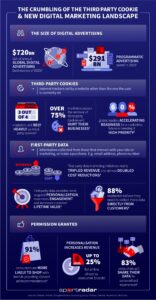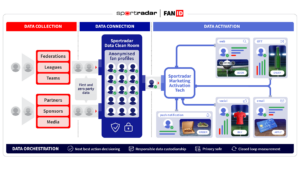When the cookie crumbles: Sportradar’s answer to Big Tech’s big dilemma By Lachlan Wills

200 years ago it was gold. Then came steel, and in the 20th Century it was oil that was the great progenitor of wealth and power.
For the past 25 years, it has been data.
When knowledge is power, online data has given companies crucial customer insights that have driven commercial decision-making.
Third-party data has been the cornerstone of the nearly trillion dollar adtech market. But, it’s soon to be no more.
Third-party data is data collected by external data providers- not by the company who’s website you are on. That data is then aggregated and ‘packaged up’ into data sets, and then sold on.
Growing community awareness has led to privacy concerns, and subsequent regulatory action.
In 2020 Google Chrome- the world’s largest browser- announced they wanted third party cookies permanently eliminated within two years.

The seismic nature of that shift has been further identified with that move being delayed to the end of 2024. Some experts feel it may even stretch into next year.
Mozilla, Firefox and Apple have already put-up strong protection barriers against third-party cookies.
Third-party data has been a lifeblood of consumer insights and decision-making, and now there is a tactical gap that needs to be filled.
Sportradar, one of the world’s largest sports tech companies, has created a new product, FanID, to fill that gap.
Sportradar Vice President Mike Falconer tells the The Ministry of Sport Podcast the industry is embracing this monumental shift.
“I think there is still more to understand, in terms of what is the impact, and how does the digital economy operate after everything is gone.
“But I think, increasingly, if you’d have talked to people two years ago, they were concerned. Really concerned about what the future looked like.
“I think if you talk to people now, there’s a much greater sense of readiness. A much greater positivity about, ‘Ok, we can build a better future between us,’” he said.
Falconer says the Sportradar product, FanID, is built on first-party and zero-party data.

“Third-party cookies were the currency, they weren’t terribly accurate, they weren’t terribly reliable. The good news is that first party data is much more accurate and reliable, because it is voluntarily given.”
Falconer says gamification and genuine fan engagement content is central to creating opportunities for fans to voluntarily share information, that can create a win-win.
“Consumers are (happy to share information) where there is evident value in return. If the cost of entry is an email address, or the basis on which they can personalise, is to share some personal insight, then I think that quid-pro-quo is certainly understood.
“I think people are beginning to get comfortable with that idea that, ‘Ok, if I give you something, I expect something in return. Don’t expect me to give you something, if I don’t get that value back.’”
Falconer also says privacy is the number one priority- both legally and morally for the platform.
For a full insight into FanID and this seismic industry shift, listen to The Ministry of Sport Podcast here: https://ministryofsport.com/ministry-of-sport-podcast/
Similar Stories

Royal Caribbean Partners with Brisbane Heat
Internationally acclaimed family holiday brand Royal Caribbean has been announced as the Official...

GRID Esports launches AI predictive analytics product for esports broadcasts
Gaming and esports data company GRID Esports has introduced GRID Insights, an artificial...

ASC launches largest ever volunteer campaign
As National Volunteer Week (NVW) commences today, the Australian Sports Commission (ASC) has...
It's free to join the team!
Join the most engaged community in the Sports Business World.
Get all the latest news, insights, data, education and event updates.






